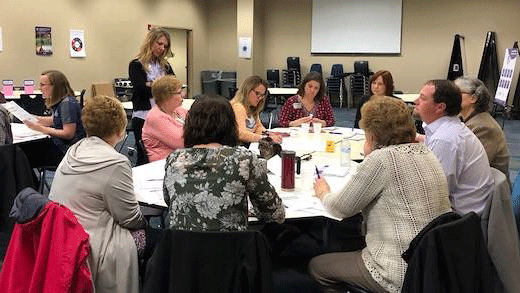Kansans take part in a conversation aimed at establishing a Culture of Health in their community.| Download this photo
Kansas Profile – Now That’s Rural: Paula Peters, Culture of Health
July 31, 2019
Could the extension service do for health what it has done for agriculture through the years? During the past century, American agriculture – with assistance from agricultural research and extension – has been transformed from subsistence farming to an agricultural system that is the envy of the world. Could similar progress occur in the health arena? To do so would require a deep cultural change that would value health as a priority. In short, we might say it requires a culture of health.
Dr. Paula Peters is associate director of extension programs for K-State Research and Extension. The term “extension” refers to the state- and county-based educational outreach programs which extend helpful research results from the nation’s land-grant universities to the public.
“For years, (extension) has done work on nutrition, foods, and physical activity,” Paula said. In a larger sense, extension has worked to support the health of families, farms and communities since the extension service was founded in 1914.
In 2014, the national Extension Committee on Policy supported the development of a national framework for extension work in public and community health. That report included the aspirational statement that extension could do for health what it has done for agriculture.
In Kansas, even before that time, the Kansas Health Foundation provided an endowment to support extension work in health. Those funds supported an Office of Community Health for several years.
“We wanted to build the capacity of our local extension agents to work in the health area,” Paula said. Funds were redirected to support grass-roots health-related extension initiatives.
This initiative reflected the fact that a deep, cultural commitment to health was needed. The initiative was called Culture of Health. “People think of improving physical health, but we are looking more broadly than that,” Paula said. “It’s also mental health, financial health, the health of the community itself.”
The initiative began with a series of facilitated community conversations with extension professionals and community partners around health issues. Then grants were offered to county and district extension units. The grant applications required that a local needs assessment be completed and that the work be implemented through collaborative coalitions.
In February 2019, K-State Research and Extension awarded $170,000 in grants for 32 projects in 51 counties across the state. These supported multiple kinds of health-related projects, such as healthy food access, physical activity, mental well-being, anti-poverty, and much more. Because they were implemented through local coalitions, agencies worked together in beneficial ways.
As a person who loves a good acronym, I appreciated projects with titles like Johnson County EATS – Easy, Affordable Tasty Solutions, Atchison County’s BOOK – Believing in Opportunities for Our Kids – and Meade County’s CATCH – Coordinated Approach To Community Health. Meade is a rural community of 1,721 people. Now, that’s rural.
Beyond the, um, catchy titles, this work dealt with serious, long-term issues. For example, the Marais des Cygnes Extension District worked on suicide prevention and mental health intervention. The Twin Creeks Extension District worked on a produce buying incentive program for low income buyers at a local farmer’s market.
In addition, the state extension team sponsored adult mental health first aid training for more than 100 extension professionals in spring 2019. “We’re not counselors but we can connect people to the resources they need.”
Another training was held in June 2019 on policy systems and environment. “We need to do more policy work to assure that healthy behaviors are supported and sustainable,” Paula said.
Most of all, this has led to a new level of collaboration on health issues. “It’s been fun to watch our agents reach to their collaborators and also each other,” Paula said.
Can extension do for health what it has done for agriculture? If Paula and her team have their way, it will. We commend Paula Peters, her specialists, and all those extension agents who are making a difference by improving our healthy behaviors. They remind us that health isn’t just going to the doctor. This is about a culture of health.
And there’s more. Next week we’ll learn about a local initiative for a basket-full of health.
Audio and text files of Kansas Profiles are available at http://www.kansasprofile.com. For more information about the Huck Boyd Institute, interested persons can visit http://www.huckboydinstitute.org.
----------------
The mission of the Huck Boyd National Institute for Rural Development is to enhance rural development by helping rural people help themselves. The Kansas Profile radio series and columns are produced with assistance from the K-State Research and Extension Department of Communications News Media Services unit. A photo of Ron Wilson is available at http://www.ksre.ksu.edu/news/sty/RonWilson.htm.


